Water buffalo tails have emerged as a popular chew treat for dogs in the US, promising hours of gnawing satisfaction. But are these tough chews truly beneficial for our canine companions, or are there potential downsides to consider? This article dives deep into the world of water buffalo tails for dogs, examining their pros, cons, and everything in between to help you make an informed decision for your furry friend.
Understanding the Allure of Water Buffalo Tails
Water buffalo tails offer a unique chewing experience for dogs, distinct from traditional rawhide or beef chews. Their dense, durable texture provides long-lasting entertainment, particularly for power chewers who quickly demolish other treats. This extended chew time can help alleviate boredom and reduce destructive behaviors stemming from pent-up energy. Furthermore, proponents of water buffalo tails often cite them as a natural, single-ingredient chew, free from artificial additives and preservatives commonly found in processed dog treats.
 Close-up of a water buffalo tail chew for dogs
Close-up of a water buffalo tail chew for dogs
Potential Benefits of Water Buffalo Tails for Dogs
Beyond the simple joy of chewing, water buffalo tails may offer some potential health benefits for dogs. The gnawing action can help promote dental health by scraping away plaque and tartar buildup, contributing to cleaner teeth and fresher breath. Additionally, the prolonged chewing can be mentally stimulating, providing a positive outlet for anxiety and stress. Some also believe that water buffalo tails can be a good source of protein and other nutrients.
Weighing the Risks: Are Water Buffalo Tails Safe for All Dogs?
While water buffalo tails can be a satisfying chew, it’s crucial to be aware of potential risks. One major concern is the potential for splintering. As dogs gnaw on the tail, pieces can break off, posing a choking hazard or causing digestive upset if swallowed. Furthermore, the hardness of water buffalo tails can be problematic for dogs with sensitive teeth or pre-existing dental issues, potentially leading to fractures or other damage. Always supervise your dog when they are enjoying a water buffalo tail and remove the chew if it becomes too small or starts to splinter excessively.
Choosing the Right Water Buffalo Tail for Your Dog
If you decide to give water buffalo tails a try, it’s important to choose a high-quality product. Look for tails that are sourced responsibly and processed without harsh chemicals or additives. Opt for tails that are appropriately sized for your dog’s breed and chewing habits. Smaller dogs should be given smaller tails to prevent choking, while larger, more aggressive chewers may require thicker, more durable options.
Alternatives to Water Buffalo Tails
If you’re looking for other chew options, consider alternatives like bully sticks, dental chews, or even durable rubber toys. These can offer similar chewing satisfaction while potentially mitigating some of the risks associated with water buffalo tails. It’s always best to consult with your veterinarian to determine the safest and most appropriate chew toys for your individual dog’s needs and health status.
Are Water Buffalo Tails Good for Puppies?
Due to their hardness and potential for splintering, water buffalo tails are generally not recommended for puppies. Their developing teeth are more susceptible to damage, and their smaller size increases the choking risk. Stick to softer, puppy-specific chews until their adult teeth have fully erupted.
Can Senior Dogs Chew Water Buffalo Tails?
Senior dogs with weakened teeth or dental issues should also avoid water buffalo tails. The hardness can exacerbate existing problems and cause pain or discomfort. Softer chews are a better option for senior pups.
Conclusion: Making the Best Chew Choice for Your Canine Companion
Water buffalo tails can be an enjoyable and long-lasting chew for some dogs, offering benefits like dental cleaning and mental stimulation. However, it’s essential to be aware of the potential risks, including choking and digestive issues. Careful supervision, selecting appropriately sized tails, and considering your dog’s individual needs are crucial for safe and enjoyable chewing experiences. Ultimately, consulting with your veterinarian is always recommended to determine the best chew options for your furry friend’s specific health and lifestyle.
FAQ:
- Are water buffalo tails digestible? While some portions may be digestible, the dense nature of these chews makes them difficult for dogs to fully break down.
- How long does a water buffalo tail last? The longevity of a water buffalo tail depends on the dog’s chewing habits, size of the tail, and individual chewing style. They can last anywhere from a few days to several weeks.
- What if my dog swallows a large piece of water buffalo tail? Contact your veterinarian immediately if your dog swallows a large piece, as it could cause blockage or other digestive issues.
- Are water buffalo tails hypoallergenic? Water buffalo tails are generally considered low-allergen, but sensitivities can still occur. Monitor your dog for any signs of allergic reaction.
- Can I give my dog a water buffalo tail every day? Moderation is key. Water buffalo tails are best offered as an occasional treat, not a daily staple.
- Where can I buy high-quality water buffalo tails? Look for reputable pet supply stores or online retailers that prioritize natural ingredients and responsible sourcing.
- What should I do if my dog’s teeth are damaged by a water buffalo tail? Seek veterinary attention promptly if you notice any signs of dental damage or discomfort.
Beautdogs.us is your premier resource for all things dog-related in the US. We offer expert advice on dog breeds, care, and product recommendations to ensure the well-being of your canine companion. Whether you’re a new dog owner or a seasoned expert, Beautdogs.us provides trustworthy information and resources to help you navigate the wonderful world of dog ownership. Contact us today for personalized advice and support. Email: [email protected], Phone: +1 501-555-7529. Beautdogs.us is your go-to source for expert canine care.